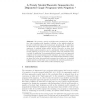28 search results - page 2 / 6 » A Syntax-Independent Approach to Forgetting in Disjunctive L... |
CORR
2002
Springer
13 years 5 months ago
2002
Springer
Abstract. Logic Programming paradigms that allow for expressing preferences have drawn a lot of research interest over the last years. Among them, the principle of ordered disjunct...
LPNMR
2001
Springer
13 years 9 months ago
2001
Springer
Much work has been done on extending the well-founded semantics to general disjunctive logic programs and various approaches have been proposed. However, no consensus has been reac...
NMR
2004
Springer
13 years 10 months ago
2004
Springer
All major semantics of normal logic programs and normal logic programs with aggregates can be described as fixpoints of the one-step provability operator or of operators that can...
AMAI
2007
Springer
13 years 5 months ago
2007
Springer
Abstract. Partial equilibrium logic (PEL) is a new nonmonotonic reasoning formalism closely aligned with logic programming under well-founded and partial stable model semantics. In...
LPNMR
2007
Springer
13 years 11 months ago
2007
Springer
Abstract. We present a purely model-theoretic semantics for disjunctive logic programs with negation, building on the infinite-valued approach recently introduced for normal logic...

